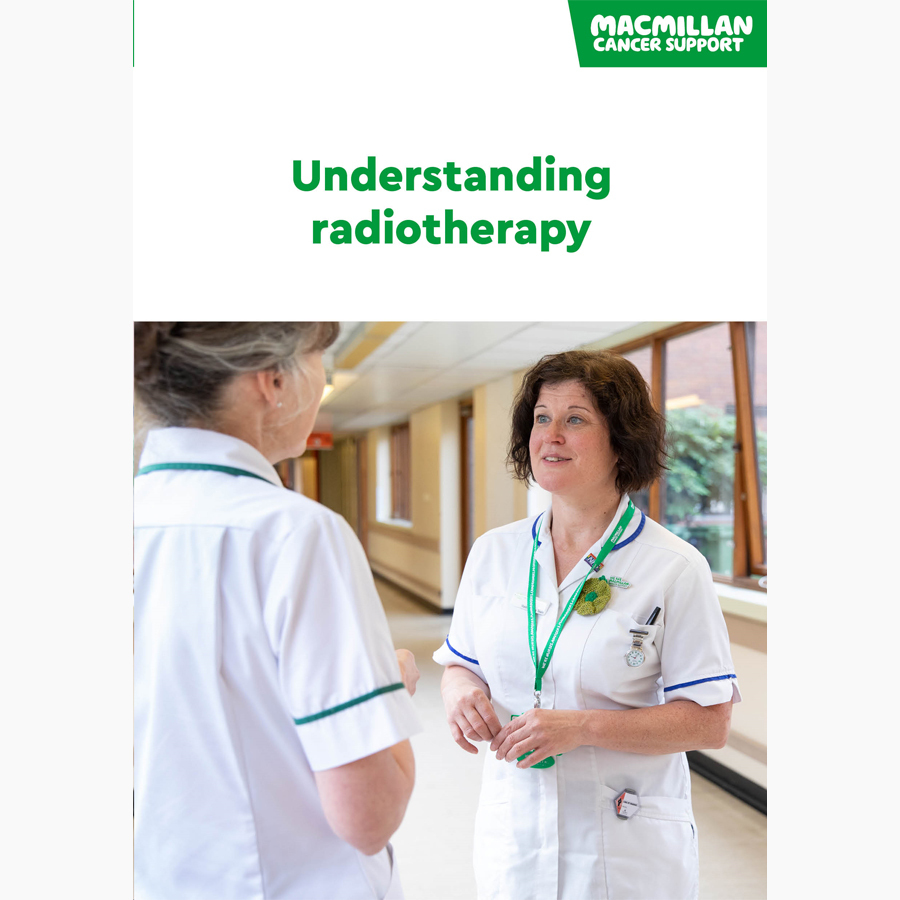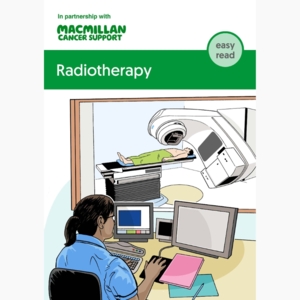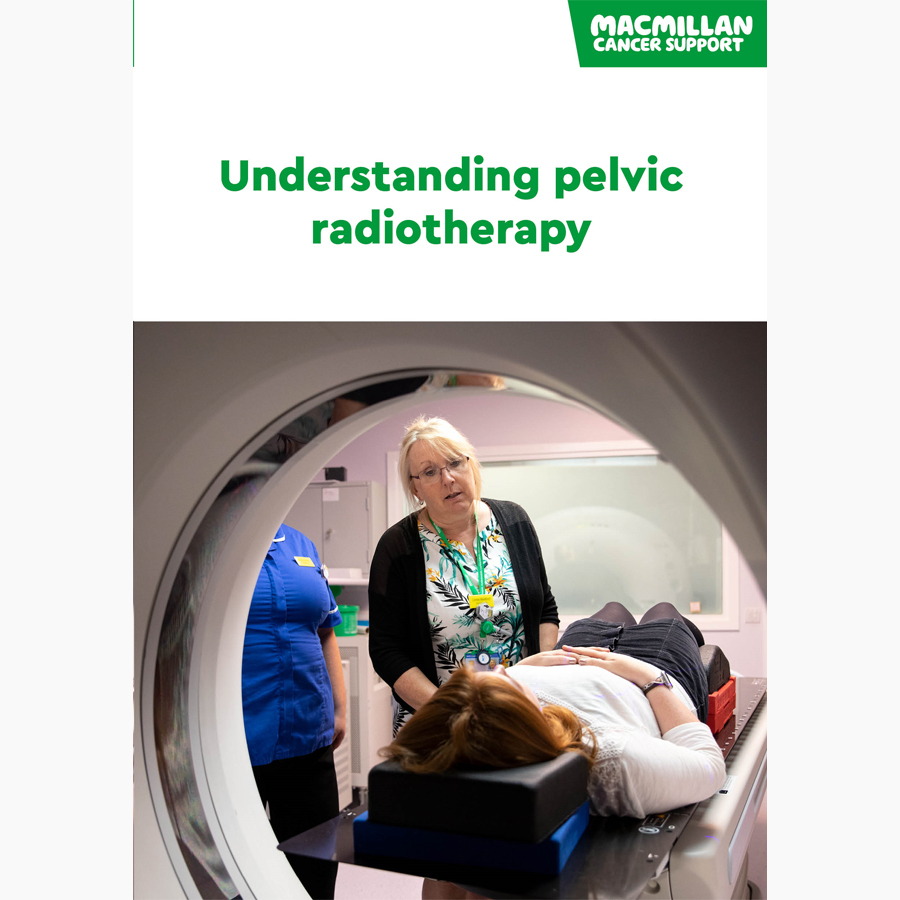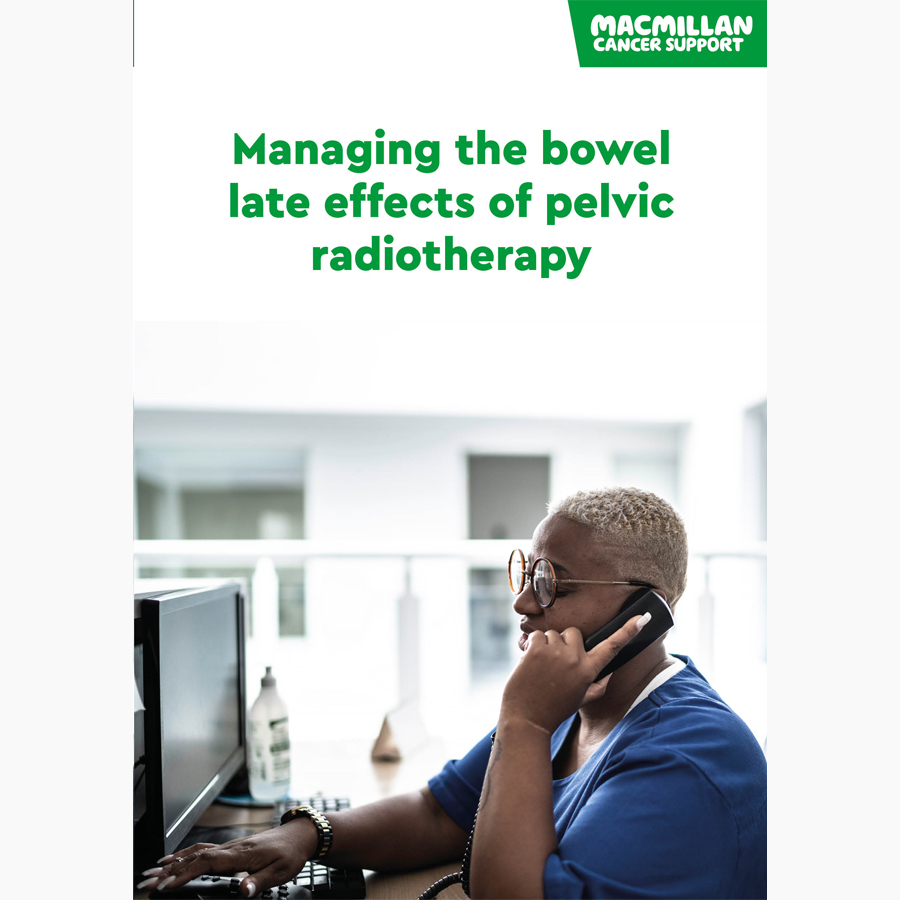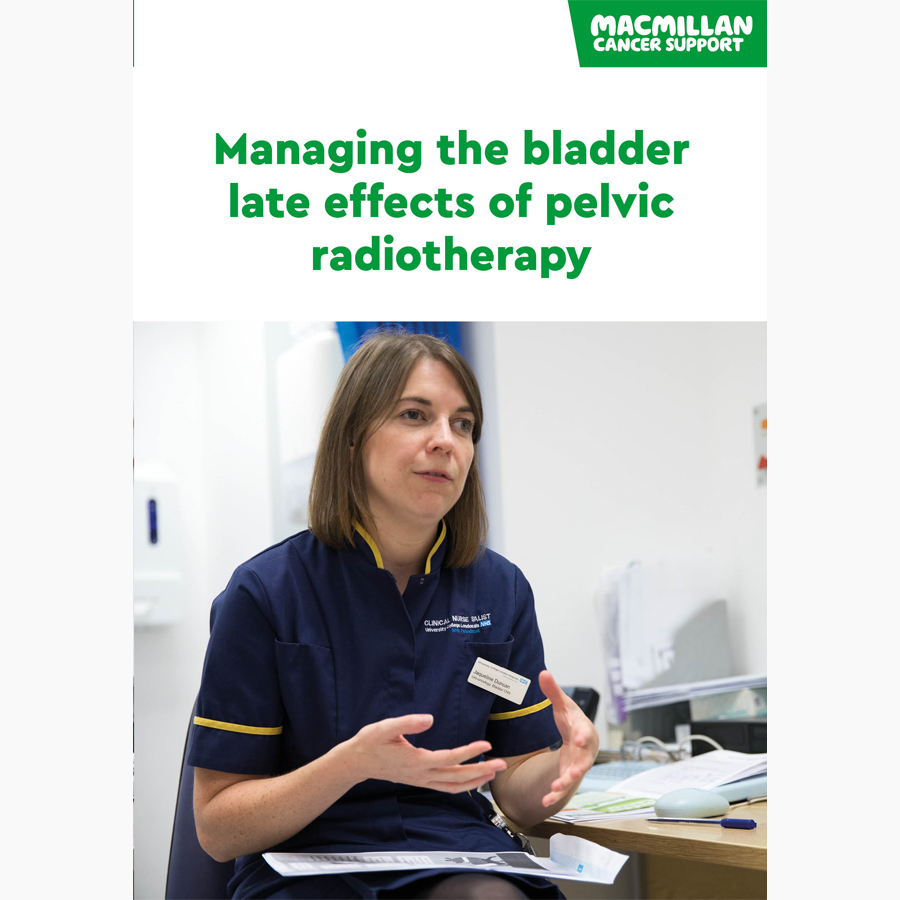Radiotherapy for rectal cancer
Radiotherapy uses high-energy rays to destroy cancer cells. For rectal cancer, you usually have radiotherapy in combination with chemotherapy. This is called chemoradiation.
On this page
-
Rectal cancer radiotherapy
-
How radiotherapy is given for rectal cancer
-
External beam radiotherapy for rectal cancer
-
Internal radiotherapy (brachytherapy) for rectal cancer
-
When radiotherapy is given
-
Radiotherapy for advanced cancer
-
Treatment sessions
-
Side effects of radiotherapy for rectal cancer
-
Possible late effects of radiotherapy
-
How we can help
Rectal cancer radiotherapy
Radiotherapy uses high-energy rays to destroy cancer cells. It destroys cancer cells in the area of the body you have it, while doing as little harm as possible to normal cells.
For rectal cancer, you usually have radiotherapy in combination with chemotherapy. This is called chemoradiation. Chemotherapy can make cancer cells more sensitive to radiotherapy.
Radiotherapy does not make you radioactive. It is safe for you to be with other people throughout your treatment, including children.
Booklets and resources
How radiotherapy is given for rectal cancer
You can have radiotherapy externally from a machine. Or you can have it internally from radioactive substance placed inside the body. Internal radiotherapy is also called brachytherapy.
You usually have external radiotherapy for rectal cancer, but it can also be given internally.
External beam radiotherapy for rectal cancer
External beam radiotherapy is given from a radiotherapy machine. The machine looks like a large x-ray machine or CT scanner.
You usually have external beam radiotherapy as short, daily treatments in a hospital radiotherapy department. These are called treatment sessions or fractions.
Each treatment session takes 10 to 15 minutes. But the treatment itself only takes a few minutes. You usually have treatment sessions Monday to Friday, with a break at the weekend. Your doctor will talk to you about the treatment and possible side effects.
Intensity-modulated radiotherapy (IMRT)
A type of radiotherapy called intensity-modulated radiotherapy (IMRT) is usually used for rectal cancer.
IMRT shapes the radiotherapy beams. This allows different doses of radiotherapy to be given to different parts of the treated area. It means lower doses of radiotherapy are given to the healthy tissue surrounding the tumour. This can help reduce the risk of side effects and late effects. It may also allow higher doses of radiotherapy to be given to the tumour.
Your doctor can tell you more about IMRT and whether it is suitable for yo
Volumetric modulated arc radiotherapy
Volumetric-modulated arc radiotherapy (VMAT) is a newer way of giving IMRT. It is sometimes called RapidArc®. The radiotherapy machine moves around you and reshapes the beam during treatment. This makes it more accurate and shortens the treatment time.
Conformal radiotherapy
Conformal radiotherapy is another way of giving radiotherapy. The radiotherapy beams are specially shaped to fit the treated area. This can reduce the side effects of the radiotherapy.
Internal radiotherapy (brachytherapy) for rectal cancer
Internal radiotherapy gives you radiotherapy from inside the body. It gives a high dose of radiotherapy to the tumour, but the areas nearby get a much lower dose
There are 2 types of internal radiotherapy for rectal cancer:
-
High-dose-rate (HDR) brachytherapy
HDR brachytherapy uses radioactive material delivered through a fine tube (applicator) placed close to or inside the tumour. The applicator connects to a machine outside the body. This machine controls the amount of radiation you receive. It switches off automatically when your prescribed dose has been given.
Before you decide to have this treatment, your doctor will explain what it involves.
You will be given information on how to prepare for treatment. You can have HDR brachytherapy as a day patient. You will usually be given a sedative before treatment. This is to help you relax and feel sleepy. You might need up to 3 treatment sessions.
Before treatment, your nurse will give you a liquid into your back passage. This is called an enema. It helps you to empty your bowels.
During treatment, you usually lie on your back with your legs raised on leg rests. The doctor or nurse puts the applicator tube into the rectum. You have an x-ray to check it is in the correct position.
The treatment is not painful and usually takes 15 to 30 minutes. When your treatment is finished the radiographers remove the applicator.
-
Low-energy contact brachytherapy (Papillon treatment)
You may have this type of brachytherapy for early rectal cancer. Your doctor will explain what it involves. This treatment is not available in all cancer centres.
You may have it on its own, with external radiotherapy or with chemoradiation. This depends on the stage of the cancer. Some people decide to have this treatment because they do not want surgery. If it does not work well, your doctor will usually advise you to have surgery.
You have Papillon treatment every 2 weeks. You might have 2 to 4 treatment sessions. You can have treatment as an outpatient. You do not need a general anaesthetic.
Before treatment, you might be asked to follow a low-fibre diet for a few days. You may also have an enema. This is when a nurse gives a liquid into your back passage, to help empty your bowels.
The radiographer will show you the right position for treatment. You might need to lie on your back or kneel over. The radiographer puts some gel around the anus to numb it. They then apply some cream to help relax the muscles.
The doctor examines the area using a sigmoidoscope and then inserts a fine tube (applicator) to deliver the radiation. The actual treatment only takes a few minutes.
This treatment is only available in a few hospitals, so you may need to travel to have it. Ask your cancer doctor whether this is an option for you. You can read more about Papillon treatment on the Clatterbridge Cancer Centre website.
Some people have brachytherapy after a course of external radiotherapy. Papillon treatment may be used on its own. This is usually if you have early rectal cancer and cannot have surgery or choose not to have it.
When radiotherapy is given
You usually have radiotherapy for rectal cancer before surgery. It is rarely given after surgery. If you are unable to have surgery, radiotherapy may be your main treatment. Some people have internal radiotherapy on its own.
Radiotherapy before surgery (neoadjuvant radiotherapy)
Radiotherapy before surgery is called neoadjuvant radiotherapy. It aims to:
- shrink the cancer to make surgery easier
- reduce the risk of cancer coming back.
You have radiotherapy as either:
- a short course Monday to Friday, for 1 week
- a long course for up to 6 weeks, usually with chemotherapy (chemoradiation).
After a short course or long course of radiotherapy, you usually wait for at least 6 weeks before having surgery. During this time, the radiotherapy or chemoradiation continues to work.
Depending on how well the treatment has worked, you might be offered the option of surveillance or monitoring rather than surgery. This involves having regular monitoring with physical examinations and tests. If there are any signs of the cancer coming back, you can then have surgery.
Radiotherapy after surgery (adjuvant radiotherapy)
If you did not have radiotherapy before surgery, you may have it afterwards. It is usually given if cancer cells are found on the edge of the healthy tissue (margin) removed during surgery. You have radiotherapy to reduce the risk of the cancer coming back. This is called adjuvant radiotherapy.
You usually have adjuvant radiotherapy Monday to Friday, for 4 to 5 weeks. You may have radiotherapy with chemotherapy (chemoradiation).
Total neoadjuvant therapy (TNT)
This means having a course of radiotherapy with chemotherapy. You can have the chemotherapy either before radiotherapy or after. You might have this treatment if the cancer is locally advanced. Depending on how well the treatment works, it might mean you no longer need surgery.
After treatment, you will be monitored closely with regular physical examinations and tests including a rectal MRI and sigmoidoscopy. If there are any signs of the cancer coming back, you can then have surgery.
Planning your radiotherapy treatment
You will have a hospital appointment to plan your treatment. You will usually have a CT scan of the area to be treated. During the scan, you need to lie in the position that you will be in for your radiotherapy treatment.
Your radiotherapy team use information from this scan to plan:
- the area to be treated
- the dose of radiotherapy.
You may have some small, permanent markings made on your skin. The marks are about the size of a pinpoint. They help the radiographer make sure you are in the correct position for each session of radiotherapy.
These marks will only be made with your permission. If you are worried about them, talk to your radiographer.
Preparing for external radiotherapy
You will be sent information about having a full bladder for your treatment sessions as guidance to when you should start drinking fluids. This will also be discussed during your first treatment session. The advice may change during your course of treatment, as your ability to hold urine will change.
Support from Macmillan
Macmillan is here to support you. If you would like to talk, you can do the following:
- Call the Macmillan Support Line for free on 0808 808 00 00.
- Chat to our specialists online.
- Visit our radiotherapy and side effects forum to talk with people who have been affected by radiotherapy, share your experience, and ask an expert your questions.
Radiotherapy for advanced cancer
You may have external radiotherapy to treat rectal cancer that has spread or has come back after treatment.
It is most likely to be used to treat cancer in the pelvis. This is the area between the hip bones. The aim is to shrink the cancer and help with symptoms such as bleeding or pain.
It may also be used to treat symptoms if the cancer has spread to other organs in the body.
Related pages
Treatment sessions
The person who operates the machine is called a radiographer. They give you information and support during your external radiotherapy treatment.
The radiographer will explain what will happen. At the start of each treatment session (fraction), they will make sure you are in the correct position on the couch and that you are comfortable.
When everything is ready, they leave the room so you can have the radiotherapy. The treatment only takes a few minutes. You can talk to the radiographers through an intercom or signal to them during the treatment. They can see and hear you from the next room.
During treatment, the radiotherapy machine may automatically stop and move into a new position. This is so the radiotherapy can be given from different directions.
Related pages
Side effects of radiotherapy for rectal cancer
Side effects depend on:
- the dose of radiotherapy
- whether it is external or internal
- whether you have chemotherapy as well (chemoradiation).
Side effects usually begin 1 to 2 weeks after starting treatment. They may continue to get worse for a few weeks after treatment, before starting to get better. Side effects usually improve slowly over the next few weeks or more.
Smoking can make side effects worse. If you smoke, try to stop or cut down.
It is important to tell your radiographer, cancer doctor or specialist nurse if you have side effects. They will give you advice on how to manage them and prescribe treatments that can help.
We have more general information about the side effects during pelvic radiotherapy treatment.
These are the most common side effects. You may not get all of these.
Tiredness
Tiredness (fatigue) can continue for weeks or a few months after your treatment has finished. You might be more tired if you have to travel to hospital each day. If you are also having other treatment such as chemotherapy or surgery, this can make you more tired.
Try to get as much rest as you can, especially if you have to travel a long way for treatment. Balance this with some physical activity, such as short walks. This will give your more energy.
Skin reactions
Sometimes the skin in the treated area and around it might:
-
feel sore or itchy
redden if you have white skin
become darker than surrounding skin if you have black or brown skin
become moist and sometimes blister or peel, usually towards the end of treatment.
Not everyone will get these side effects. Your radiographer or specialist nurse will give you advice about looking after your skin. Tell them straight away about any skin changes. They can give you advice or treatments if needed, such as creams or dressings.
During treatment, you are usually advised to:
- wash your skin gently with mild, unperfumed soap and water
- gently pat dry and avoid rubbing your skin
- wear loose-fitting clothes made from natural fibres, such as cotton
- follow your radiotherapy team’s advice about moisturising the treated area
- spend some time sitting or lying on your side to help to relieve any discomfort around the back passage and perineum.
Skin reactions should get better within 4 weeks of treatment finishing.
Bowel changes
You may experience problems with your bowel such as:
- loose stools (poo) or diarrhoea
- passing a lot of wind
- needing to pass stools urgently and more frequently
- cramping pains in your tummy or back passage
- constipation
- tenesmus – the feeling that you need to go to the toilet even if your bowel is empty
- having some bleeding or mucus coming from the back passage.
Tell your doctor or nurse if you have any of these symptoms.
If you have diarrhoea, your doctor will prescribe anti-diarrhoea tablets to help. You might also be advised to make changes to your diet during radiotherapy.
Tell your specialist nurse or radiographer if you have any leakage (incontinence). They will give you advice and explain how to look after the skin in that area.
Pain
You may have some stinging or pain when you pass stools. Your doctor can prescribe local anaesthetic creams to help with this. Tell your doctor or nurse if you have any pain.
Inflammation of the bladder (cystitis)
Radiotherapy to the rectal area may cause inflammation of the lining of the bladder. This can make you feel you want to pass urine (pee) more often. It also gives you a burning feeling when you pass urine.
It helps to drink plenty of water and other fluids. Your doctor can prescribe medicine to make passing urine more comfortable.
Hair loss
Most people lose their pubic hair after radiotherapy to the pelvic area. It should grow back after your treatment finishes, although sometimes pubic hair loss might be permanent.
Changes to the vagina
Sometimes radiotherapy might make the lining of the vagina sore and inflamed. If this happens, you may be advised not to have sex during treatment and for a few weeks afterwards.
Radiotherapy can make the vagina narrower, less stretchy and drier than before. This can make having sex painful. It can also make having internal examinations difficult in the future. During and after treatment, your nurse may recommend you use vaginal dilators to try to prevent the vagina from narrowing. Dilators are plastic tubes shaped like a tampon. They are available in different sizes that you use with a lubricant.
Vaginal dryness can be relieved with lubricants or creams. Hormone creams can also help with dryness and vaginal narrowing. These are available on prescription from your GP.
Early menopause
If you are still having periods, radiotherapy to the pelvic area may cause the menopause. This means you will not be able to get pregnant. Your doctor can prescribe hormone replacement therapy (HRT) to improve symptoms of the menopause.
Effects on the ovaries and womb
Radiotherapy for rectal cancer can affect the ovaries and the lining of the womb. This often means you will not be able to get pregnant or be able to carry a pregnancy after treatment.
If you would like to have children in the future, talk to your doctor or specialist nurse before you start treatment. There may be options for preserving your fertility.
We also have information about fertility and cancer treatment.
Contraception
It is important that you do not get pregnant or make someone pregnant during radiotherapy, and for a few months after it has finished. Your doctors usually recommend that you use contraception during this time.
Problems getting an erection
Radiotherapy for rectal cancer can cause problems getting or keeping an erection. This is called erectile dysfunction or ED. Your radiotherapy team can explain what is likely to happen. There are different treatments that can help with ED.
You may also have a sharp pain when you ejaculate. The pain should get better a few weeks after treatment finishes. You might also find that you ejaculate less fluid or none at all.
Effects on sperm
Radiotherapy to the pelvis might make you infertile (unable to make someone pregnant). It may be possible to have sperm stored before treatment starts. This is called sperm banking. It is important to talk to your cancer doctor or specialist nurse about this before your treatment starts.
Related pages
Possible late effects of radiotherapy
You may still have side effects months after treatment finishes. Or you may develop new side effects months or years later. These are called long-term side effects or late effects.
Newer ways of giving radiotherapy aim to reduce the risk of getting late effects. There is slightly more risk of developing late effects when you have radiotherapy and chemotherapy together (chemoradiation). Your doctor or nurse will talk to you about this.
Always tell your specialist nurse or cancer doctor if side effects do not get better, or you notice new side effects.
Some late effects include:
- bladder changes, such as needing to pass urine more often or urgently
- bowel changes, such as diarrhoea or bleeding from the back passage
- effects on your sex life.
We have more information about these and other late effects of pelvic radiotherapy. This includes advice on how they can be managed or treated.
Booklets and resources
About our information
This information has been written, revised and edited by Macmillan Cancer Support’s Cancer Information Development team. It has been reviewed by expert medical and health professionals and people living with cancer.
-
References
Below is a sample of the sources used in our rectal cancer information. If you would like more information about the sources we use, please contact us at
informationproductionteam@macmillan.org.uk
National Institute for Health and Care Excellent (NICE). Colorectal cancer. NICE guideline [NG151]. Updated December 2021. Available from: www.nice.org.uk/guidance/NG151 [accessed Jan 2023].
Cervantes A, Adam R, Rosello S, et al. Metastatic colorectal cancer: ESMO Clinical Practice Guideline for diagnosis, treatment and follow-up. Annals of Oncology. 2023 ;34(1):10-32. Available from: www.annalsofoncology.org [accessed Jan 2023].
Sanoff HK. Improving treatment approaches for rectal cancer. New England Journal of Medicine. 2022;386(25); 2425–2426. Available from: www.doi.org/10.1056/NEJMe2204282 [accessed Jan 2023].
Date reviewed

Our cancer information meets the PIF TICK quality mark.
This means it is easy to use, up-to-date and based on the latest evidence. Learn more about how we produce our information.
The language we use
We want everyone affected by cancer to feel our information is written for them.
We want our information to be as clear as possible. To do this, we try to:
- use plain English
- explain medical words
- use short sentences
- use illustrations to explain text
- structure the information clearly
- make sure important points are clear.
We use gender-inclusive language and talk to our readers as ‘you’ so that everyone feels included. Where clinically necessary we use the terms ‘men’ and ‘women’ or ‘male’ and ‘female’. For example, we do so when talking about parts of the body or mentioning statistics or research about who is affected.
You can read more about how we produce our information here.



